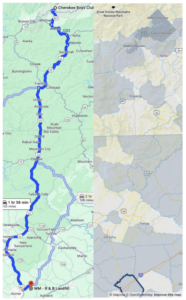Eastern Band of Cherokee Indians Awarded $5 Million for Clean Transportation Investments
Earlier this year, members of the Clean Transportation Team and the Policy & Markets Team assisted the Eastern Band of Cherokee Indians (EBCI) in preparing their Priority Climate Action Plan (PCAP) for the EPA’s Climate Pollution Reduction Grant (CPRG). The Center compiled emissions reductions calculations for the project and helped to write the implementation plan.
The CPRG program is authorized as part of the Inflation Reduction Act and provides nearly $5 billion in grants to state, local governments, tribes, and territories to develop and implement ambitious plans for reducing greenhouse gas emissions and other harmful air pollution. EBCI’s proposal is to develop a solar microgrid and storage system at the Cherokee Boys Club school bus depot, install solar power at Tribal buildings, and install electric vehicle (EV) charging infrastructure through the town of Cherokee to support the widespread adoption of EVs.
On September 5, 2024, the EPA announced the selections for the Tribes and Territories Implementation Grants, through which EBCI will be awarded an anticipated $4,999,999. The award will allow EBCI to purchase and deploy 15 electric school buses and one Class 8 heavy-duty electric truck, develop a 400-kW solar microgrid and 80-kW diesel energy storage system to help power eight fast charging stations to support the electric school bus fleet, construct a 52-kW and 121-kW solar array on tribal buildings, install 20 publicly accessible Level 2 EV public charging stations, and enhance energy affordability and equity by providing access to clean, affordable energy options.
Introducing a zero-emissions Class 8 truck will offer benefits to the communities along the 103-mile route that the existing truck takes to haul trash to Homer, GA, six days a week. The cumulative annual health benefits to the surrounding communities are estimated to be $17,000 with the use of the Class 8 truck. The map below, created by John Bonitz, shows the truck route compared to the areas of Environmental Justice communities, which are shown in gray.

Due to a school board decision, routes for the school buses have changed, thus increasing the mileage from the original proposal. This increase in mileage increases the electrical load – the demand for electricity. Due to this, the Clean Power and Industrial Efficiency team at the Center will be reviewing the entire project to ensure the project is designed to meet the needs of the community. The Center looks forward to supporting the EBCI throughout the project period.